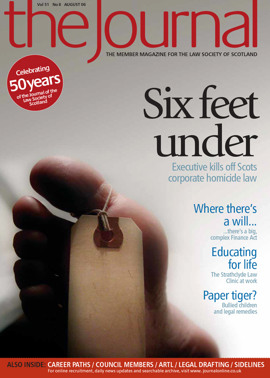PSG's suite moves
The Property Standardisation Group has now completed the suite of lease management documents by adding to the PSG website (www.psglegal.co.uk) an Irritancy Protection Agreement and a Deposit Agreement, both with the customary accompanying guidance notes.
As property lawyers will know, irritancy protection agreements are frequently used in circumstances where one party is taking a sublease of property and needs protection against the irritancy of the head lease, this being achieved by the grant of an undertaking by the head landlord to grant a lease direct to the subtenants in the event of such irritancy. Whether and to what extent one can obtain such agreement depends on the circumstances of the case. Some landlords are reluctant to enter into any such forward commitment, particularly when the premises sublet are not the whole premises let under the head lease. Nonetheless it is thought that the PSG document will be useful in circumstances where this form of agreement is to be entered into.
The deposit agreement is designed to regulate the terms under which an initial financial deposit is made by a tenant whose covenant strength may be questionable, providing the landlords with a pot of money into which they can dip in order to compensate for any tenant breach. Such deposit arrangements can vary in duration from one year to several years or the whole term of the lease. In certain circumstances, the deposit arrangements can be released if certain further covenant tests are met, and the PSG document provides some suggested wording for that.
The current PSG letter of consent to assignation envisages the possibility of landlords’ consent being subject to the delivery of a suitable form of guarantee. The Group will look at the possibility of producing an alternative version of this which envisages the delivery of a deposit agreement instead of a guarantee, thereby linking into the new PSG deposit agreement.
Future projects
Following the summer break, the Group will continue to monitor progress of the production of the sixth edition of the City of London Law Society’s certificate of title with a view to producing a PSG sixth edition to replace the current fifth edition. Progress on that will of course depend on the progress made by the CLLS in England.
The Group will also be looking at the idea of producing a form of commercial offer. The likelihood is that, if this idea is advanced, the offer will be drafted on the basis of a purchase of commercial property with vacant possession; in other words, it will not be an investment purchase-type offer, which has its own separate and further issues to consider.
Commendable innovation
Finally, the Group is delighted to record that in the Innovative Lawyers Awards in the Financial Times of 29 June 2006, the Group was “highly commended” in the Open/General category, missing out by only one point from being categorised as “standout”. Aside from being a tribute to the efforts of the Group, it is testimony also to the fact that innovative ideas in the Scottish legal market can receive due accreditation in the wider UK context.
Contact details remain as before:
- douglas.hunter@dundas-wilson.com
- iain.macniven@mms.co.uk
- rachel.oliphant@mcgrigors.com
- ann.stewart@shepwedd.co.uk
Iain G Macniven, Maclay Murray and Spens
In this issue
- Ireland 4, Italy 0
- A lack of trust
- Technology and the Scottish courts
- For supplement read tax - an update
- Eyes on the ball
- Don't leave gaps in regulation
- Keeping company
- Fighting the bullies
- The university of life
- A lack of trust (1)
- With these few words...
- Tell it like it is
- All that sparkles ain't gold
- PDF is the standard
- The paper monster
- Safeguarding fair trial
- New law, new problems
- Raising the stakes
- Mark the pre-proof
- Scottish Solicitors Discipline Tribunal
- Website reviews
- Book reviews
- It takes two to tango
- Land attachment and suspensive missives
- PSG's suite moves






